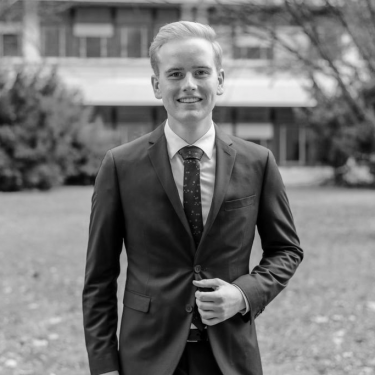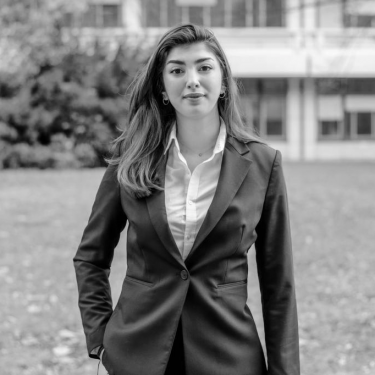Participants’ Reflections on the 2023 Jessup German National Rounds
The Jessup Reunion in Berlin
On 4 March 2023 the German National Rounds of the world’s biggest and most prestigious moot court competition, the Philip C. Jessup International Law Moot Court, came to an end. Having represented the Ruhr-Universität Bochum in this year’s competition, we will reflect on this stressful but extremely rewarding experience. After two years of the competition being remote, we finally had the chance to connect in-person with 16 other German teams at the Hertie School of Governance in Berlin.
Everyone, who has ever been involved in the Jessup, knows that participating is a journey. The final step of our Jessup journey started on Wednesday, 1 March 2023. In the morning we met at the train station in Bochum and finally went on our way to Berlin, to the 2023 German National Rounds of the Philipp C. Jessup Moot Court. Our coaches predicted how much fun an in-person Jessup would be in contrast to online mooting, and it turned out to be far better than we had ever imagined.
Arrival in Berlin
After our arrival in the capital, sticking to our priorities, we first got some lunch. While eating we picked up the words “applicant memorial” from the other end of our table. We realized that we had randomly sat down next to another team of the competition. It was a forecast of the great connections that we could find at the National Rounds and that only happened thanks to the return of the in-person format.
The Hertie School hosted the opening ceremony, which ended up being a great kickoff for the following days. After a warm welcome from the organizers from Hertie – Managing Director Dr. Axel Baisch and Professor Dr. Pierre Thielbörger, Shannon Hutchins from ILSA and Dr. Christian Dolff from Noerr, the sponsor of the evening, we had the opportunity to get in touch with the other teams and got to share experiences that turned out to be quite similar. All the teams lived through the same amount of hard work, dedication, and preparation in the past months. We enjoyed the opportunity to connect with other participants and members of the Jessup family but got more nervous as the time went by since the release of the opponent memorials came closer.
At 9pm, the run to the hotels began where our team gathered to review the memorials and prepare for the first rounds. We had been dreading this moment, anticipating that the memorials of our opponents would reveal arguments that we would face completely unprepared. However, it gladly turned out that we all had stumbled over the same ideas and sources, allowing us to face the matches confidently.
In Medias Res: The Moments We Have Been Training For
The actual rounds were everything we hoped they would be: challenging, exciting and thrilling. This was the moment when all the hard work showed and paid off. We had the chance to prove what we had learned over the past seven months. Our pleadings were put to test by many highly qualified and equally motivated judges, who asked the toughest questions and pushed us to improve our pleadings once again. During the rounds, the greatest challenge, however, was to keep cool while listening to the other teams and their arguments and trying to think about how we could improve our own arguments even more for the next rounds.
The discussions with the judges and opponents achieved a very high legal level. Even though it was immediately apparent that rhetorical skills and presentation were definitely important, what seemed to matter most to the judges were the legal issues and the discussion of the case.
The thrill of the Preliminary Rounds peaked on Friday evening at the announcement ceremony which was held in the beautiful Festsaal Kreuzberg and was sponsored by Blomstein. After a welcome from the organizers and a round of questions and answers by the special guest, the German Federal Minister of Justice, Marco Buschmann, the teams that qualified for the advanced rounds were announced. The evening then turned into a party for some teams and another round of hard work and preparation for the teams that would plead the next day.
The quarterfinals began early in the morning of the final day. It was a series of tense matches, with every team knowing that this could be one of the last steps towards their ticket for the international rounds in Washington D.C.
The last rounds for the third and first place were held in the unique location of the Kammergericht, the halls of the highest court of ordinary jurisdiction in Berlin. Both rounds took place simultaneously in two courtrooms. While the final was held in the great hall and gained the bigger part of the attention, the match for the third place was particularly tense. Here, the teams had the last chance to secure the remaining third place for the international rounds since only the three best German teams qualified for Washington D.C.
We all eagerly followed the arguments of the two best teams in the final, who faced the questions of some of the most qualified judges, including the German Judge at the International Court of Justice, Professor Dr. Georg Nolte. We liked both teams’ performances and could not possibly foresee which of the two teams would win the match.
In the evening, all the teams gathered full of excitement for the Jones Day Championship Dinner. Everyone was eager to know which three teams had made it to Washington. All the announcements were made during the dinner at a gorgeous setting next to the river Spree. Between the courses, awards – e.g. for the best memorial, best oralist or Spirit of the Jessup – were given to the teams and judges to validate individual accomplishments. Judge Tim Eicke of the European Court of Human Rights gave the students inspiring suggestions on how to pursue a career in international law. After the award ceremony, excellent food and rousing speeches by the guests, the time had finally come: we learned from Dr. Christian Fulda of Jones Day that Bucerius Law School, Humboldt-Universität zu Berlin and Universität Heidelberg were officially Germany’s teams to advance to DC. After a big celebration of the winning teams, a lively exchange among fellow students and friends of international law led to new acquaintances, friendships and new memories that we will all treasure. We particularly enjoyed the conversations with the judges and were finally allowed to talk about the case.
Final Reflections
With that our journey came to a festive end. Overall, the German National Rounds were an amazing experience that we looked forward to for the last seven months and will keep in fond memory for much longer. For keeping this memory alive, we recommend to watch the little video clip that Hertie School produced about the event. All the stressful moments of the preceding months have been absolutely worth it.
We realized that all teams, regardless which corner of Germany they came from, had been working towards the exact same goal: to make the Jessup Moot Court a unique experience. We all found ourselves having fun conversations about the many arguments that were thought through over and over again, the long days in the office, and countless anecdotes about how we made the Jessup a once in a lifetime experience for every one of us. It concluded the German National Rounds on a perfect note.
At this point, we as a team want to thank all the people that are responsible for this amazing event. The Hertie School, the administrators and organizers, the sponsors and, of course, the judges and bailiffs. Thank you for making it possible for us to experience this remarkable event! The Philipp C. Jessup Moot Court changed us and turned a bunch of strangers into a team and a group of friends. To live through this event together was probably the most challenging and rewarding task we faced in our studies so far.
We can’t wait for next year’s competition!

Eveline Guschtschin studies law at Ruhr-Universität Bochum. She did her specialization in Public International Law.

Nina Harbecke studies law at Ruhr-Universität Bochum. She works as a student representative for her University in the European alliance UNIC.

Patrick Beer is a student assistant at Ruhr University Bochum’s Institute for International Law of Peace and Armed Conflict (IFHV).

